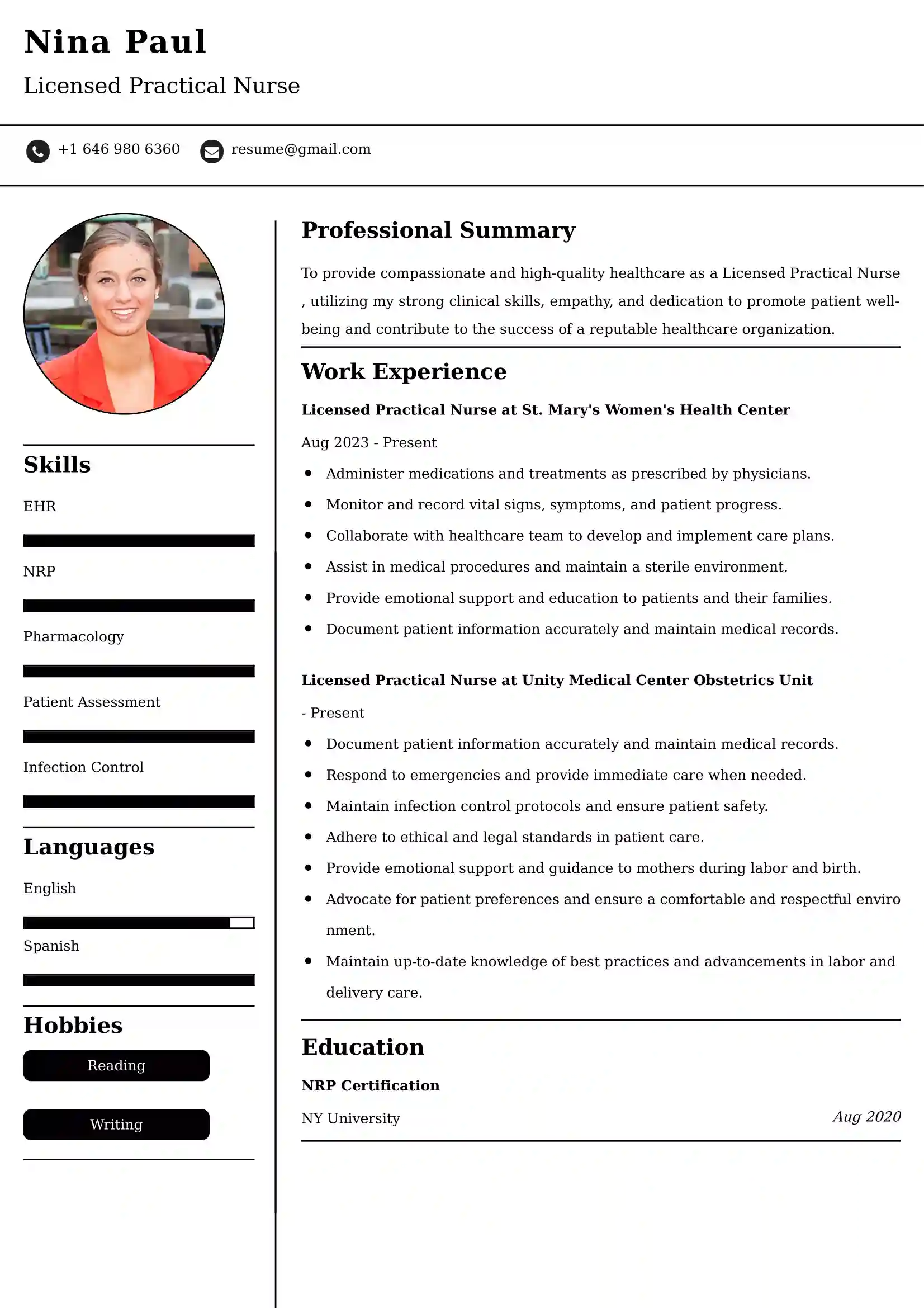Resume
Crafting a compelling nursing resume is essential for standing out in the competitive healthcare industry. Our guide provides valuable insights, from creating a strong summary to formatting tips and answering common FAQs.
nursing jobs
Use the following guidelines and resume examples to choose the best resume format.
Labor And Delivery Nurse Resume Sample

Lpn Resume Example

Caregiver Resume Example

Introduction:
Welcome to our comprehensive guide on crafting an effective nursing resume. Whether you're an experienced nurse or a recent graduate, a well-crafted resume is crucial to showcasing your skills, qualifications, and experience in the competitive field of nursing.
About Nursing:
Nursing is a noble profession that requires a unique blend of technical skills, compassion, and resilience. Nurses play a vital role in healthcare, providing direct patient care, advocating for patients, and collaborating with healthcare teams to ensure the best possible outcomes.
How to Craft a Strong Nursing Resume Summary or Objective:
- Tailor to the Job: Customize your summary or objective for each application, emphasizing the skills and experiences relevant to the specific nursing role.
- Highlight Achievements: Showcase your accomplishments, such as successful patient outcomes, improvements in processes, or any recognitions received.
- Emphasize Soft Skills: Apart from technical skills, emphasize soft skills like communication, empathy, and teamwork, crucial in the nursing profession.
- Quantify Your Impact: Use quantifiable metrics to demonstrate the impact of your contributions, whether it's a percentage of patient improvement or the number of successful interventions.
- Use Keywords: Incorporate keywords from the job description to pass through applicant tracking systems and demonstrate alignment with the employer's needs.
- Show Continuous Learning: Highlight any ongoing education, certifications, or training to showcase your commitment to professional development.
Guidelines on Creating a Professional Nursing Resume:
- Clear Contact Information: Ensure your name, phone number, email, and LinkedIn profile (if applicable) are easily visible at the top of your resume.
- Professional Summary: Include a brief professional summary that encapsulates your experience, skills, and what you bring to the table as a nurse.
- Detailed Work Experience: Provide detailed descriptions of your work experience, focusing on your responsibilities, achievements, and impact in each role.
- Education and Certifications: Clearly list your educational background and any relevant certifications, ensuring accuracy and completeness.
- Skills Section: Create a dedicated section for your skills, including both technical and soft skills relevant to nursing.
- Tailor for Each Job: Customize your resume for each application, aligning your skills and experiences with the specific requirements of the job.
How to Format Your Nursing Resume for Maximum Impact:
- Clean and Professional Layout: Use a clean, professional layout with easy-to-read fonts and sufficient white space.
- Chronological Order: Arrange your work experience in chronological order, starting with the most recent position.
- Bullet Points: Use bullet points to make your resume easy to scan, focusing on key achievements and responsibilities.
- Consistent Formatting: Maintain consistent formatting throughout your resume, including font sizes, bolding, and italics.
- Appropriate Length: Keep your resume concise, typically not exceeding two pages, to ensure the reader's attention is maintained.
- Include Relevant Keywords: Integrate relevant keywords from the job description to enhance the visibility of your resume.
FAQs:
Q1: How can I make my nursing resume stand
out from others?
A: Tailor your resume for each application,
emphasize achievements, and showcase a balance of technical and soft skills.
Q2: Is including a cover letter necessary
with my nursing resume?
A: While not mandatory, a well-crafted cover letter
can provide additional insights into your qualifications and passion for
nursing.
Q3: Should I include clinical experience in
my resume?
A: Yes, include relevant clinical experience to
demonstrate your hands-on skills and exposure to different healthcare settings.
Q4: How important is continuing education in
nursing resumes?
A: Continuing education signals a commitment to staying current in the field;
include relevant courses and certifications to strengthen your resume.
Q5: Can I use a template for my nursing
resume?
A: Yes, but ensure the template is professional and
customizable. Tailor it for each application to showcase your unique qualifications.
Explore these specialized examples to tailor your nursing resume for specific roles and maximize your chances of landing your dream job.
More Resume Examples for the Next Step in Your Resume Career jobs
- Acute Care Nurse Resume
- Advanced Practice Rn Resume
- Caregiver Resume
- Er Nurse Resume
- Geriatric Nurse Practitioner Resume
- Labor And Delivery Nurse Resume
- Lpn Resume
- Nurse Practitioner Resume
- Nursing Assistant Resume
- Oncology Nurse Resume
- Pediatric Nurse Resume
- Registered Nurse Resume
- Public School Nurse Resume
- Trauma Nurse Resume
More Cover Examples for the Next Step in Your Cover Career jobs
- Acute Care Nurse Cover Letter
- Advanced Practice Rn Cover Letter
- Caregiver Cover Letter
- Chief Nursing Officer Cover Letter
- Er Nurse Cover Letter
- Geriatric Nurse Practitioner Cover Letter
- Labor And Delivery Nurse Cover Letter
- Lpn Cover Letter
- Nurse Practitioner Cover Letter
- Nursing Assistant Cover Letter
- Oncology Nurse Cover Letter
- Pediatric Nurse Cover Letter
- Registered Nurse Cover Letter
- Public School Nurse Cover Letter
- Trauma Nurse Cover Letter
Get started with a winning resume template
800+ Resume Samples in ATS Format, HR Approved for Your Success
Step into the world of resume excellence with our comprehensive collection of 800+ samples, meticulously designed in ATS-friendly format and rigorously approved by HR professionals. Your path to success starts here as you craft a resume that effortlessly navigates through automated systems and captures the attention of hiring experts. Explore now and take the first step towards landing your dream job.
Resume Examples
What clients say about us
Our Resume Are Shortlisted By











